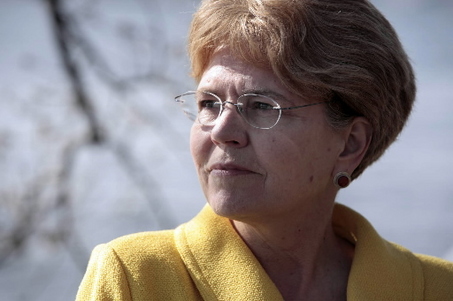forum
library
tutorial
contact

Obama Officials to Discuss Salmon in Portland
by Matthew PreuschThe Oregonian, May 22, 2009
|
the film forum library tutorial contact |

|
Obama Officials to Discuss Salmon in Portland
by Matthew PreuschThe Oregonian, May 22, 2009 |
 The Obama administration is coming to town to talk salmon.
The Obama administration is coming to town to talk salmon.
On Tuesday, the president's lead environmental policy adviser and the head of the nation's top fisheries agency will be in Portland to hear from dam operators, scientists, tribes and the states about the region's emblematic and endangered fish.
The administration has reversed a number of Bush-era environmental rules, and salmon watchers have been wondering when President Barack Obama's staff would engage in earnest on one of the Northwest's most contentious and costly natural resource conundrums.
Salmon in the vast Columbia Basin have been in decline for years, a phenomenon linked with dams and the destruction of habitat.
Obama's emissaries will arrive as a federal judge in Portland threatens to scuttle the government's plan for running its big hydroelectric dams on the Columbia and Snake rivers while keeping salmon from going extinct.
"Federal defendants have spent the better part of the last decade treading water, and avoiding their obligations under the Endangered Species Act," U.S. District Court Judge James Redden wrote this week.
Administration officials, most notably Jane Lubchenco, an Oregon State University biologist who now leads the National Oceanic and Atmospheric Administration, have kept quiet over whether they would stick with the salmon plan, called a biological opinion, that was put forward by the Bush administration.
Opponents of the plan think they have an ally in Lubchenco and the new administration.
"We feel like we have a voice now," said Rebecca Miles, a member of the governing council of the Nez Perce Tribe, which has challenged the plan in court.
In a letter sent to tribes and the governors or Oregon, Washington, Idaho and Montana, Barry Thom, the acting regional director of NOAA, said Lubchenco would be in the region only to listen, not to dictate new policy.
"She approaches this session without having reached any judgment about the 2008 FCRPS Biological Opinion and does not intend to convey any views she may reach in this listening session," Thom wrote Wednesday.
Lubchenco, along with Nancy Sutley, chairwoman of the White House Council on Environmental Quality; Laura Davis, chief of staff at the Department of Interior; and Terrence "Rock" Salt, principal deputy assistant secretary of the Army, will hear from the parties at the DoubleTree Hotel at Lloyd Center on Tuesday afternoon.
"We are very pleased to see Dr. Lubchenco make the commitment to spend a week and get all the information she can," said Mike Carrier, Gov. Ted Kulongoski's natural resource adviser.
"This administration is taking a very careful look at all of these natural resources policies that were enacted by the previous administration that were controversial," Carrier said.
Not everyone is pleased, however: Environmental and fishing groups, which weren't invited to the meeting, plan to protest outside the hotel. The next day, Lubchenco and others will go to the U.S. Army Corps of Engineers' Lower Monumental Dam to hear from the corps about changes there that have helped salmon.
That will be a symbolic visit, because in his letter, Judge Redden says the government needs to consider removing the Lower Monumental and three other lower Snake River dams if their strategy isn't sufficient to help salmon.
Redden holds the hall pass for the continued operation of the system of federal dams. That system not only provides the region with relatively cheap power but also kills fish making their way between inland rivers and the sea.
In his letters, the judge has seemed to side with opponents of the plan that the government is relying too much on improvements to stream habitats and the Columbia estuary -- improvements that might not provide fish the best chance for recovery and aren't guaranteed to be completed.
Federal officials and advocates for keeping the dams in place are somewhat surprised by Redden's recent harsh talk, in part because he'd said before he thought the plan was "very close."
They also point to the unprecedented collaborative effort in which the state of Washington and most Northwest tribes help develop the plan.
Some of the government's new allies were caught off guard by the short notice about the visit.
"This is a really strange process," said Tim Weaver, litigation counsel for the Yakama Tribes, which has sided with the government's salmon plan. "I've been doing this for about 40 years, and this is the strangest thing I've ever seen."
Weaver said Lubchenco had already met in Washington, D.C., with representatives from Oregon and the Nez Perce Tribe, which oppose the plan, but his tribal leaders -- who aren't suing the government -- haven't had similar access.
Such is the scientific and political thicket Lubchenco and others enter next week. The government has until the end of next month to decide what to do about the court fight.
"I think the new administration really is going into this tabula rasa," said Brian Gorman, a spokesman for NOAA. "They want to find out what the situation is, what the status is and what the issues are, and they will see what the changes are that are appropriate."
learn more on topics covered in the film
see the video
read the script
learn the songs
discussion forum
